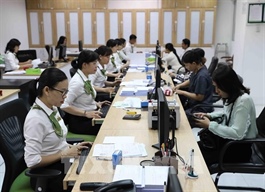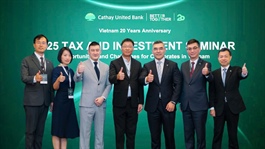Sweeping changes spotlight new financial growth drivers
Sweeping changes spotlight new financial growth drivers
Vietnam is entering a pivotal phase where sweeping reforms, surging urbanisation, and new asset classes are reshaping its financial markets.
The Vietnam Wealth Advisor Summit (VWAS) 2025 is scheduled to take place on September 25 in Hanoi. The annual forum is organised by Vietnam Investment Review in collaboration with the Vietnam Wealth Advisor community, under the auspices of the Ministry of Finance.
The global economy continues to face a prolonged high-interest-rate cycle, largely driven by inflationary pressures stemming from geopolitical conflicts. At the same time, rising protectionism and a slowdown in global trade have created a risk-laden and challenging business environment.
In response, Vietnam has been embarking on sweeping strategic adjustments, which helps promote a growth model that prioritises the private sector, innovation, and tech development.
Within this transformation, the financial market is expected to undergo the fastest changes, with new asset classes and investment mechanisms emerging. Meanwhile, the establishment of international financial centres is set to serve as a critical engine, providing leverage for Vietnam’s next phase of economic acceleration.
VWAS 2025 will gather leading domestic and international experts to engage in in-depth discussions on the impact of new institutions and growth drivers on the economy and financial markets.
Cautious sentiment
As Vietnam steps into a new era, its financial market is already witnessing transformative milestones: the stock market is approaching an upgrade in global classification; digital assets are beginning to be legalised; an international financial centre is being established; and the regulatory framework is being continuously improved.
These institutional breakthroughs, combined with global economic headwinds, present both opportunities and risks for investors. Recognising the key variables that could shape economic performance by year’s end will be crucial for investors to build flexible, forward-looking asset allocation strategies.
Vietnam’s stock market entered late August and early September with notable volatility. After approaching the 1,700-point threshold, the VN-Index quickly corrected to the 1,624-1,667 range, reflecting investors’ cautious sentiment amid conflicting signals on interest rates and capital flows.
This has prompted individual investors to question whether they should continue holding stocks or shift towards fund certificates as a more stable investment channel.
According to Phan Le Thanh Long, chairman of AFA Group, while valuations are no longer particularly attractive, investor sentiment and liquidity remain the primary forces driving the market upward.
“In this environment, every buy or sell decision needs careful consideration. Liquidity is still strong, but investors must exercise strict risk management and choose stocks intelligently, rather than being swayed by whether something looks cheap or expensive,” Long said.
“The overall view is that the market can continue its upward momentum, but valuations are stretched and risks are rising. Investors should diversify their portfolios appropriately. Frequent trading may prove less effective than holding quality stocks for the long term,” he added.
Another significant investment channel is gold. According to Nguyen Minh Tuan, CEO of AFA Capital, Decree No.232/2025/ND-CP is to pave the way for ending the monopoly on gold bar production, raising expectations of a more transparent, competitive, and stable market while unlocking dormant gold capital.
“The ultimate goal of this reform is to restore gold to its true nature as a commodity, ending its dual role as both currency and commodity, which has previously pressured exchange rates, eroded foreign reserves, and contributed to the economy’s inflation-hedging of gold,” Tuan noted.
He outlined three phases of reform. The first is laying the foundation by completing the legal framework such as Decree 232, issuing technical standards, and testing infrastructure that links businesses and banks with the State Bank of Vietnam.
The second is implementation and supervision, including enforcing new rules on bank transfers, e-invoicing, and gold bar production licensing, while monitoring and connecting transaction data.
The final phase is consolidation and expansion, aimed at establishing a national gold exchange or integrating gold into commodity exchanges, where physical gold can be listed and held in custody at reputable institutions, allowing investors to trade flexibly rather than hoarding it in safes.
“Only when gold becomes a transparent financial asset class integrated into the economy’s capital flows, instead of lying dormant in household safes, can reform truly succeed,” stated Tuan.
Real estate has also emerged as one of the most closely watched investment channels this year. Despite numerous government measures to ease bottlenecks, the market remains fraught with risks as property prices continue to soar.
Property bubble risk
Analysing the root causes of this persistent price escalation, economist Economic expert Le Xuan Nghia pointed to a severe supply imbalance. According to him, two critical factors underpin this bottleneck: a regulatory apparatus that has lost its effectiveness and excessive bureaucratic hurdles in land and construction administration.
“When overlapping and cumbersome procedures restrict supply, prices inevitably rise, pushing low-income households further out of reach of the market,” Nghia explained.
Even more concerning, he argued, is the abnormal supply-demand dynamic in the real estate market. Unlike conventional markets, where rising prices encourage sellers to cash out, property owners tend to hold on for even higher prices. This creates a disconnection where supply and demand run in parallel, leading the market closer to collapse.
“If authorities do not act swiftly and decisively to release genuine supply, the risk of a property bubble is very real,” he warned. “We cannot complacently believe that the market is thriving, when beneath the surface lies a looming collapse.”
According to Nghia, the market outlook is primarily driven by the government’s provincial merger policy, a strategic move that is expected to trigger a strong wave of urbanisation nationwide, creating bustling twin cities and shaping a real estate market with new growth momentum.
“A series of national flagship infrastructure projects, including high-speed railways, expressways, seaports, and various other developments, will ignite an unprecedented urbanisation trend, not only concentrated in major cities but also expanding across multiple regions of the country,” said Nghia.
“I expect this development will gradually bring real estate prices back to their fundamental values, after distortions caused by the previous supply shortages,” he added.
|
|
Vietnam Wealth Advisor Summit 2025 VWAS 2025 will feature two main activities, with the core conference consisting of two presentation and discussion sessions under the themes “Building the Market’s Springboard” and “Finding Breakthroughs for Asset Classes”. The sessions will bring together top policymakers, economists, and financial experts from Vietnam and abroad. In addition, the event will include an awards ceremony honouring eight outstanding financial products and services of 2025. Voting is available at www.vwa.vir.com.vn. |
- 10:51 15/09/2025

























